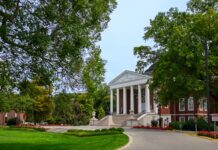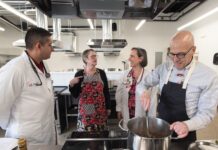
Four faculty members at the J.B. Speed School of Engineering spent the first half of this academic year on sabbatical. Jeffrey Hieb, engineering fundamentals; Stuart Williams, mechanical engineering; John Usher, industrial engineering; and Jacek Zurada, electronic and computing engineering, each had a different focus for their time off.
Jeffrey Hieb, who teaches engineering fundamentals, spent his time as the first TILL Faculty Fellow with the Delphi Center for Teaching and Learning. His focus was active learning and active learning classroom environments, a teaching method that challenges students to participate in lessons and class activities. The new Belknap Academic Classroom Building opening this fall is entirely dedicated to active learning. He visited some schools that have large active learning classroom buildings and talked with faculty and professional development staff at schools that practice active learning.
“I’m convinced that this is not a fad,” Hieb said.
Stuart Williams, mechanical engineering, used his leave to visit family and colleagues in Raleigh, North Carolina. He worked at North Carolina State University with his host Orlin Velev, a chemical engineering professor who specializes in colloids, which are fluid-like materials. Specifically, Williams examined bourbon samples from Brown-Forman to study the colloids in the spirit. Those colloids color the body of the liquid, giving it a visible haze, which to date has yet to be quantified or measured. His research into what patterns are made when microdroplets of bourbons are dried may be used to someday identify counterfeits.
“With my sabbatical, I was able to make significant strides into a new area,” said Williams, who teaches fluid power and experimental fluid mechanics. “I will be able to apply what I learned towards new research activities in my lab at the University of Louisville.” The bourbon research is ongoing and results are expected next year, he said.
John Usher, former associate dean of the Speed School who then lead the School as acting dean, used his sabbatical for a professional reset before his return this spring to teaching and research work. It was his first sabbatical in 30 years. He reconnected with his department (industrial engineering) with one-on-one meetings. He also traveled and caught up with his family.
“While those activities were productive, what I will remember most is the extra time I was able to spend with Lynn, my four kids and my 1-year-old grandson,” Usher said.
Jacek Zurada, electrical and computer engineering, traveled extensively during his sabbatical. He attended two research conferences and delivered technical keynote addresses. He also visited Purdue University and several Polish technical universities, including the Warsaw University of Technology and his alma mater, the Gdansk University of Technology. His objective was to initiate new collaborations with researchers in the field of computational intelligence.
“Both at Purdue and in Poland, I was impressed by the immense progress that is being made in the field of ECE. I was impressed with research in microelectronics, communications and computing, especially when augmented with artificial intelligence. This research has brought disruptive changes in ways people work, interact, communicate and spend their free time,” he said.































